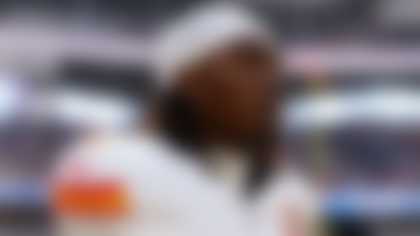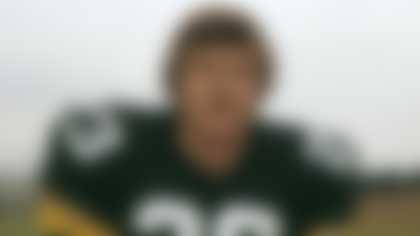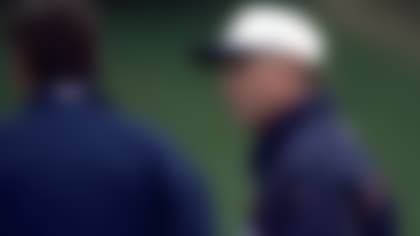ATLANTA -- Atlanta Falcons outside linebacker Vic Beasley Jr. strolled into his team's indoor facility last week with an undeniable bounce in his step, a 24-year-old looking very much like he was savoring this unprecedented time in his life. The Falcons had wrapped up their final practice before a trip to Houston to meet the New England Patriots in Super Bowl LI. The black Nike warm-up jacket he wore was unzipped low enough to expose a Clemson sweatshirt that served as a pseudo shout-out to the national championship his alma mater had claimed a few weeks earlier. Beasley also proudly pointed out that the black hat he wore -- the one with "The 'Hood" printed on the front -- was a marketing idea directly tied to the Falcons' often-uttered motto, "In Brotherhood."
That should've been enough evidence to explain Beasley's upbeat mood that day, but then he started talking about another subject that pleased him even more: The bond he's built with Falcons defensive end Dwight Freeney. The mere mention of Freeney, a 15th-year veteran, made Beasley sit up a little straighter in his seat as a wide smile stretched across his face. He looked like a young child giddy to tell you about this amazing gift he'd found, that he knew how much a simple twist of fate had vaulted him into NFL stardom. That relationship has been so rewarding that when asked about Freeney's impact, Beasley initially said, "I really don't even know how to put that into words."
It ultimately didn't take long for Beasley to summarize why Freeney has played such an integral role in Beasley breaking out in his second year. Beasley always had the requisite skills to be a true difference-maker in the NFL -- breathtaking speed, an explosive get-off and enough mind-blowing agility to give offensive tackles fits. What he didn't have before this season was a sage mentor to show him how to harness all that talent. That's the blessing Freeney delivered when he signed as an unrestricted free agent with the Falcons this past offseason.
The change in Beasley has been profound, as he went from four sacks in what some categorized as a disappointing rookie season to a league-leading 15.5 this year.
"He's meant so much to me," Beasley said of Freeney. "Bringing him on this team and into this organization has been a great help. He just preaches a work-hard mentality and compete at a high level and the way to prepare yourself each and every week."
"He's like a sponge," Freeney said. "He wants to learn and I am here to help. That is the role of a veteran -- to help the younger guys and advance their careers as much as possible."
It helped that Beasley and Freeney had plenty in common from the start. When Freeney entered the NFL as a first-round pick of the Indianapolis Colts in 2002, he was an undersized, fleet-footed edge rusher who was supposed to be the centerpiece of a revamped defense that head coach Tony Dungy was erecting within that franchise. Beasley joined the Falcons with similar expectations. Head coach Dan Quinn and general manager Thomas Dimitroff coveted speed at all positions and Beasley's 4.53 clocking in the 40-yard dash made him a dream pick in the 2015 draft.
Aside from that shared experience, Freeney had a vibrant personality that served as nice complement to Beasley's reticent, soft-spoken nature. There was an obvious confidence to Freeney that Beasley sorely needed -- and that assertiveness began to show up in the second-year player's game this season. Beasley first turned heads in a 23-16 win over Denver in Week 5, when he finished that contest with 3.5 sacks. He had three other games with at least two sacks as Atlanta's defense began to improve over the course of the year.
The Patriots are well aware of the kind of havoc Beasley can cause their passing game on Sunday. As New England left tackle Nate Solder said, Beasley is a "great athlete, an incredible athlete. He's a had a phenomenal season, really gets to the quarterback and gives a lot of pressure. It's a real challenge for us, for sure." The Falcons also understand how vital it is that Beasley generates the kind of production that has been lacking in a postseason where he hasn't had a sack yet.
"We (want to) try to get pressure on him as quick as we can," Beasley said. "Just try to get him off his spot. We understand that he's the main weapon in their offense. So if we can shut him down, we'll have a great chance."
The knocks on him were unfair -- "If you look at everybody who was drafted at that position (that year), there wasn't anybody who had more (sacks) than him," Falcons defensive coordinator Richard Smith said -- and Beasley also had to deal with issues off the field. His father, Vic Sr., was fighting liver cirrhosis after years of struggling with alcoholism. Vic Jr. literally watched his father dying as he started living his dream of playing pro football.
Beasley already had known the immense pain of losing a loved one, as his older brother, Tyrone Barrett, died in a car accident before Beasley's final season at Clemson and an uncle succumbed to cancer later that year. When his father's health began to decline, it sent Beasley's spirits plummeting to new lows. Vic Sr. had been a safety and wide receiver at Auburn in the mid-1980s, the man who introduced his son to the game, the doting dad who tossed footballs to his young son as Vic Jr. made diving catches on their living room sofa. Vic Sr. went from that to being the listless figure stretched across a hospital room bed on the many days Vic Jr. came to visit him in his hometown of Adairsville, Georgia.
When asked about the hardest moments during that time, Beasley said, "His pain. Seeing him lying in a seat and not being able to move at times. I know that he was a person that likes to move around and it was just hurtful just to see him when he couldn't move."
Beasley rarely let people outside of his inner circle know the agony he was feeling last fall. However, those who watched him stand out at Clemson often wondered what happened to the dominant force who had frustrated so many opposing quarterbacks in college. One report went so far as to say the Falcons had pondered trading or cutting Beasley after the way 2015 ended. What those skeptics didn't know was that Beasley already was planning on a season of redemption.
After his father's death in April, Beasley said, "Ultimately, it made me stronger. A stronger person off the field and even on the field. I just wanted to dedicate this season to him. I know he wanted the best for me, and if he was still here today, he would tell me to keep working and that he's so proud of me and the man that I've become."
Beasley couldn't know it at the time but another man would enter his life with a similar desire to see the best in the young talent. When Freeney signed with the Falcons last August, Atlanta was hoping to find the same benefits that Arizona had mined from Freeney a year earlier. Freeney had been a critical element in the Cardinals' run to the NFC title game last season, as he produced a team-leading eight sacks after being signed off the street in October 2015. He also provided the type of leadership and wisdom that helped the younger players in that locker room prosper.
When Freeney met Beasley, he saw a player who already was working hard with coaches in the offseason to hone his techniques. Freeney wanted to take things to the next level. His goal was to teach Beasley the finer points of the game: the importance of recognizing formations, the subtle changes in an offensive tackle's stance depending on run or pass plays, the various ways to set up a blocker for a rush that might not come until the next series. As Falcons defensive tackle Grady Jarrett said, "There's so much off-the-field [film room] stuff you can learn from a guy like Dwight."
"I really took Vic under my wing," Freeney said. "Vic is a guy who has lot of the same traits I had when I was coming out of college. I was fast, quick and agile. But the thing is -- when you're young, you don't know much. You just run around and make plays because you're athletic. My thing with Vic was just to try to raise his IQ a little bit, his awareness, when you use different moves, when you don't use certain moves, (that) when you see certain protections, this is what this means so you can do different things."
"The idea was to have a guy like that with a young pass rusher like Vic Beasley," Dimitroff said. "Dwight knew he was going to come here and we were going to be focused on ramping up our pass rush. He was going to be a big part -- whether it was sacks, pressuring the quarterback or leading our guys -- and I think that was big for him."
The difference in the Falcons' defense became more obvious with each passing week. A unit that had been the weak link in 2015 -- when Atlanta started that season 5-0 before dropping eight of its final 11 games -- improved immensely over the second half of this year. A defense that includes seven starters with two years or less NFL experience played with more confidence and better results as the team claimed the NFC South title and the No. 2 seed in the postseason. Despite finishing 27th in the league in scoring defense (by allowing 25.4 points per game), the Falcons held opponents to an average of 18.8 points per contest in their final five regular-season wins.
Beasley amassed five sacks during that stretch, while also forcing a fumble. Freeney didn't have any (he finished the year with three sacks while playing in a backup role), but his impact was obvious. The question now is if these two players, along with the rest of the Falcons' defense, can create enough problems for Brady to give Atlanta a decided advantage. They've already beaten two other elite quarterbacks in the playoffs -- Seattle's Russell Wilson and Green Bay's Aaron Rodgers -- so confidence shouldn't be an issue.
The Falcons already can see a bright future for this defense, largely because of the major steps Beasley took in his own development this year. When he thought about the biggest factor behind his growth, he said, "I honestly think it's the work ethic that I've picked up this offseason and the experience I had. I played in a lot of games that first year. (Linebackers coach Jeff Ulbrich) spent countless numbers of hours with me, and the addition of Dwight helped bring a different (dimension) to our defense."
Freeney -- who is battling a calf injury -- agreed with that assessment, as well. He's among a handful of Falcons who've ever played in a Super Bowl -- four, to be exact, as opposed to the Patriots' 22 -- but he also realizes that experience isn't the only reason teams end up winning this game. It also takes extraordinary performances from key players. The way Freeney sees it, Vic Beasley Jr. has turned himself into the kind of talent who should expect to stand out on this stage.
"Hopefully, (the mentoring) rubbed off on him in a good way," Freeney said. "So when I'm long gone, he can keep on doing it."
Follow Jeffri Chadiha on Twitter @jeffrichadiha.




